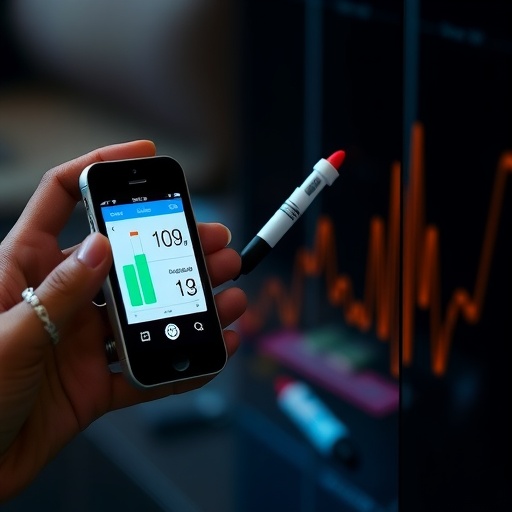In an increasingly digital world, the management of chronic conditions such as diabetes has become a focal point for researchers and healthcare professionals alike. A compelling recent study conducted by Kalra and colleagues examines the intricate challenges associated with suboptimal basal insulin titration in India, a country facing a significant diabetes burden. Their analysis not only addresses the existing hurdles but also proposes innovative digital solutions aimed at enhancing patient care and treatment efficacy. As the incidence of diabetes rises dramatically, refining insulin therapy has never been more critical, particularly when traditional methods fall short.
The study acknowledges that in India, a multitude of factors contributes to the suboptimal administration of basal insulin. Cultural attitudes towards diabetes, variations in healthcare access, and economic disparities all play crucial roles in shaping patient experiences with insulin therapy. One primary concern highlighted by the authors is the lack of standardized protocols for insulin titration among healthcare providers. This inconsistency leads many patients to receive inadequate doses of insulin, which can exacerbate their condition and lead to complications.
Moreover, the authors emphasize the psychological aspects associated with diabetes management. Many patients experience anxiety related to insulin use due to fear of hypoglycemia. This fear can foster an environment where patients are reluctant to adhere to their prescribed treatment plans. The study advocates for a paradigm shift in how healthcare providers communicate with patients, suggesting that empathy and understanding can foster better adherence and ultimately improve patient outcomes.
Another vital aspect that the research emphasizes is the role of digital health technologies. The authors affirm that mobile health applications and continuous glucose monitoring systems can revolutionize insulin titration. By utilizing data analytics and artificial intelligence, healthcare providers can offer personalized insights into blood glucose patterns, allowing for precise insulin adjustments. This technology not only empowers patients to take control of their health but also brings healthcare providers into a closer, collaborative relationship with their patients.
The study further explores the potential for telemedicine, which has become increasingly relevant in the post-pandemic world. Offering virtual consultations allows healthcare providers to monitor patients more actively, ensuring that titration decisions are informed by real-time data. This immediacy could dramatically enhance the management of diabetes, particularly in rural areas of India where access to specialized healthcare is often limited.
In addition to technological innovations, the study highlights the importance of caregiver education. Training family members or caregivers can significantly impact patient adherence to insulin regimens. Support systems are paramount; when patients have a robust support network, they are more likely to follow through with difficult treatment protocols. Engaging caregivers in the diabetes management process ensures that patients are supported both emotionally and physically.
Kalra et al. also make a case for policy reforms that can facilitate better diabetes care in India. They urge the Indian government to promote awareness campaigns that target both patients and healthcare providers. These initiatives should focus on the importance of adhering to insulin therapies and the complex nature of managing diabetes. Such educational campaigns could create a more informed society where diabetes is better understood and managed.
The authors conclude with a hopeful vision of the future, one where the integration of digital health solutions results in substantial improvements in insulin titration practices. They acknowledge that the journey towards optimizing diabetes care will involve concerted efforts from multiple stakeholders, including healthcare professionals, patients, policymakers, and technology developers. Each group must collaborate to create an interconnected system where information is shared, barriers are broken down, and best practices are adopted widely.
In summary, the findings presented by Kalra and their colleagues provide rich insights into the complexities surrounding basal insulin titration in India. By recognizing the unique challenges presented by local contexts and embracing innovative digital solutions, there is immense potential to enhance the quality of care provided to diabetic patients. The changes advocated by the authors stand to benefit not only individuals living with diabetes but also contribute to the broader public health landscape in India.
As the study suggests, the need for tailored solutions is more pressing than ever. The integration of digital tools and a more empathetic approach to patient care can profoundly transform the management of diabetes in a nation where the prevalence of this condition continues to grow. The time has come for stakeholders in India to act decisively, leveraging technology and compassion to reshape the future of diabetes care.
In conclusion, the discourse around diabetes management is evolving, influenced by technological advancements and growing awareness of the psychological dimensions of health care. Kalra et al.’s research provides a necessary framework to inspire necessary changes in insulin titration practices across India. Ultimately, the goal remains clear: to ensure that diabetes management is not only effective but also accessible and understanding of the challenges faced by patients.
Subject of Research: Optimization of Basal Insulin Titration in India
Article Title: Expert Opinion on Optimizing Suboptimal Basal Insulin Titration in India: Addressing Challenges and Leveraging Digital Solutions
Article References:
Kalra, S., Kalra, P., Gangopadhyay, K.K. et al. Expert Opinion on Optimizing Suboptimal Basal Insulin Titration in India: Addressing Challenges and Leveraging Digital Solutions.
Diabetes Ther 16, 1327–1339 (2025). https://doi.org/10.1007/s13300-025-01747-2
Image Credits: AI Generated
DOI: https://doi.org/10.1007/s13300-025-01747-2
Keywords: Diabetes management, Basal insulin titration, Digital health solutions, Telemedicine, Psychological aspects of diabetes care, Policy reforms, Healthcare education




